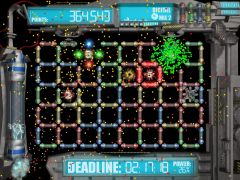|
Interview with Alter Ego Games Studio
 The CMP Game Group (producer of Game Developer magazine, Gamasutra.com, and the Game Developers Conference) established the Independent Games Festival in 1998 to encourage innovation in game development and to recognize the best independent game developers. They saw how the Sundance Film Festival benefited the independent film community, and wanted to create a similar event for independent game developers as well as the student population of game developers. The CMP Game Group (producer of Game Developer magazine, Gamasutra.com, and the Game Developers Conference) established the Independent Games Festival in 1998 to encourage innovation in game development and to recognize the best independent game developers. They saw how the Sundance Film Festival benefited the independent film community, and wanted to create a similar event for independent game developers as well as the student population of game developers.
For this interview, I talked with some of the developers from Alter Ego Games Studio, makers of the IGF finalist Revolved. Although the concept could be compared to other match puzzlers like Bejeweled, don't be fooled. The simple idea of rotating squares takes on a whole new meaning here.
 Who are you and how were you involved in Revolved?
Who are you and how were you involved in Revolved?
|
 Congrats on making it to the IGF finals. How's it feel?
Congrats on making it to the IGF finals. How's it feel?
|
 How long have you guys known about the IGF and how long have you wanted to participate?
How long have you guys known about the IGF and how long have you wanted to participate?
|
 How did you guys come together to form Alter Ego Games?
How did you guys come together to form Alter Ego Games?
|
 Where did the idea for Revolved come from?
Where did the idea for Revolved come from?
|
 What were some of the major design issues? How were they solved?
What were some of the major design issues? How were they solved?
|
 What technical issues arose as a result of deciding to keep the game small and oriented at a wider audience?
What technical issues arose as a result of deciding to keep the game small and oriented at a wider audience?
|
 What was the single largest problem during development from start to finish? How was it overcome?
What was the single largest problem during development from start to finish? How was it overcome?
|
 How long was Revolved in production?
How long was Revolved in production?
|
 True enough. What tools were used to create Revolved?
True enough. What tools were used to create Revolved?
|
 Quality of life is the new hot topic in the industry today. What do you guys do to keep the pressure off and still have fun? Any thoughts on QoL in the industry today?
Quality of life is the new hot topic in the industry today. What do you guys do to keep the pressure off and still have fun? Any thoughts on QoL in the industry today?
|
 What are the goals you guys have set with Alter Ego Games? What are you looking to do in the future?
What are the goals you guys have set with Alter Ego Games? What are you looking to do in the future?
|
 What advice would you give to others looking to strike out on their own as well?
What advice would you give to others looking to strike out on their own as well?
|
Interview conducted by Drew "Gaiiden" Sikora
Click here to post your comments in the forums
|